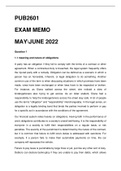PUB2601
EXAM MEMO
MAY\JUNE 2022
Question 1
1.1 meaning and nature of obligations
A party has an obligation if they fail to comply with the terms of a contract or other
agreement. When a contractual duty is breached, the legal system frequently offers
the injured party with a remedy. Obligation can be defined as a scenario in which a
person has an honorable, inherent, or legal obligation to do something. Another
common use of the term is when discussing situations in which promises have been
made, vows have been exchanged or when laws have to be respected or broken.
For instance, as Diana walked across the street, she noticed a slew of
kindergarteners also trying to get across. As an older student, Diana had a
responsibility to help the kindergarteners across the street stay safe. A lot of people
use the terms "obligation" and "responsibility" interchangeably. In the legal sense, an
obligation is a legally binding bond that binds the parties involved to perform or pay
for a specific act in accordance with the conditions of the agreement.
Our financial system relies heavily on obligations. Having faith in the performance of
one's obligations contributes to a society's overall well-being. It is the responsibility of
everyone in a society to fulfill their responsibilities on a regular basis, or risk
penalties. The severity of the punishment is determined by the nature of the contract,
but it is common that failure to fulfill one's duties is addressed with sanctions. For
example, if a person fails to make their automobile payments on time, the car
company will repossess the vehicle.
Failure to pay taxes is punishable by large fines or jail, just like any other sort of duty.
Debtors can declare bankruptcy if they are unable to pay their debts, which allows
, creditors to recover part of their losses in the form of assets owned by the debtor.
This allows creditors to recover some of their losses.
Individuals and organizations that enter into a contract with another party, written or
unwritten, have obligations. As an example, politicians have a formal commitment to
serve their constituents, but they may also have an unwritten obligation to make
decisions that will benefit their most important backers. It is nearly impossible to
show the existence of such agreements, and as a result, such responsibilities cannot
be properly regulated. Contracts of any significance have long been subject to strict
legal enforcement under justice systems dating back to the Roman era. The
following sections should be outlined in order to better comprehend the nature of an
obligation.
The nature of public administration
Comparatively speaking, the field of public administration is a relative newcomer in
the Social Sciences. Since the advent of the Administrative state, public
administration has grown in prominence. Administration was more important in the
ancient Greek, Roman, and Indian governmental systems. He made an enormous
contribution to administration in the form of Kautilys' "Arthasathry," which covers all
aspects of the state and its relations with subjects. In a nutshell, public administration
is the state's machinery. Administration plays an important part in every political
system. Government policies and programs, and the behavior of individuals (typically
non-elected) technically responsible for their conduct, are at the heart of public
administration. There are two distinct meanings associated with the term "public
administration." Even though Public Administration encompasses all three branches
of government (legislative, executive, and judiciary), in its narrower sense it only
addresses the actions of the executive branch.
Environmental factors impact on public administration
There are great expectations for the dividends of democracy in a democratic system
of government. Public goods are intended to be given by the government to meet the
demands of citizens for personal security, social order, welfare, social services, and
general prosperity. Governments and public employees must work tirelessly and
faithfully for the benefit of society and its members in order to meet these demands




